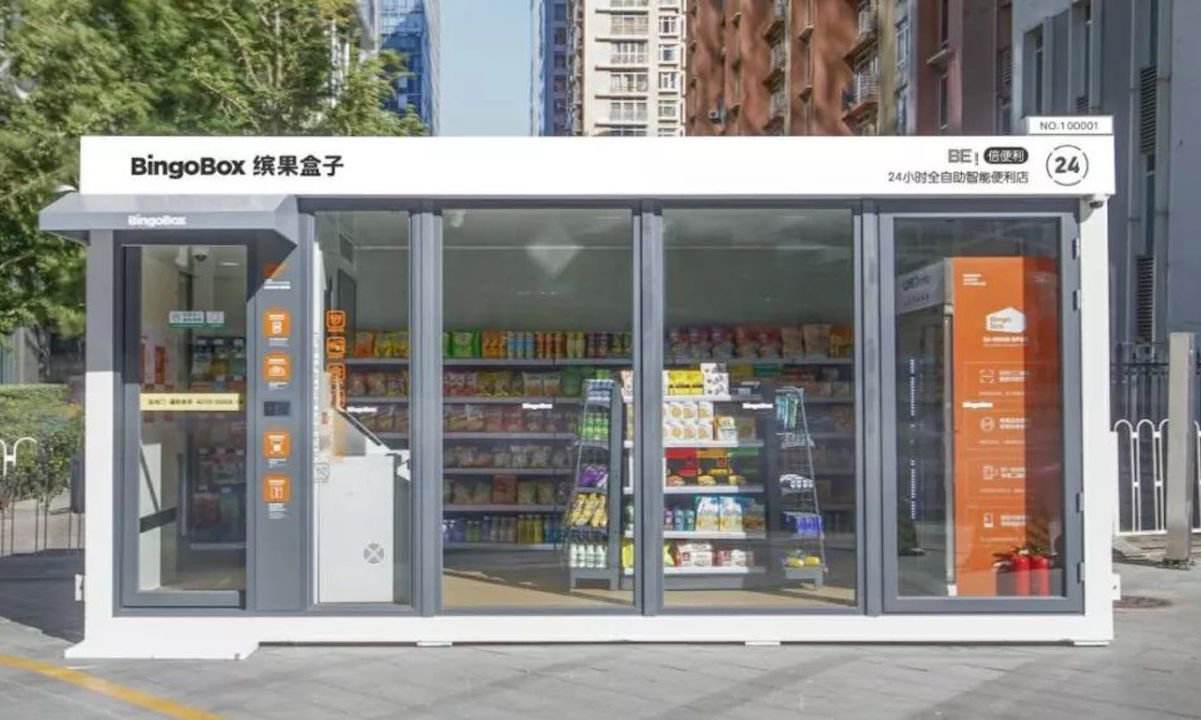Unmanned retail in China is an emerging industry, which can be seen by the unmanned stores popping up in China’s malls and city centers. Both online and offline channels of China’s retail industry are currently under pressure. Online shopping had been rapidly developing since 2011, especially between 2014 and 2016 when the growth rate of online retail sales kept higher than 20%. However, in recent years, online sales growth rate has slowed, will likely be lower than 20% in next a few years. This could indicate that online shopping platforms are closing in on their market potential. Despite that the online platform is one of the most important drivers for Chinese retail; offline stores are still a significant market. But the offline shopping has been undeveloped recently, between 2014 and 2016, the growth rate of China’s offline sales size was lower than 10%. Furthermore, offline stores have to afford higher labor and land costs. Thus, it is necessary to discover new growth points for the retail industry, offline unmanned stores are one of the main directions as it has a significantly lower labor cost.

Unmanned stores are predicted to keep developing
Under these circumstances, offline unmanned stores have achieved good development in recent years. According to research from iResearch, there were nearly 200 unmanned convenience stores opened in China by the end of November 2017. Last year, the total market size of unmanned stores was 40 million CNY and it will reach 3.3 billion CNY by 2020. In 2017, the annual sales of unmanned stores were 39 billion CNY. During the same year, based on the data from ASKIC Consulting, the total users of unmanned stores was 5 million in 2017, and it will be 85 million in 2020. Among all unmanned retail users in 2017, 68% are male and 32% are female, 67.3% users are between 31-40 years old. Moreover, most unmanned stores are now located in tier-1 and tier-2 cities, such as Beijing, Shanghai, Guangzhou and Shenzhen. There are currently 13 unmanned convenient stores and 15 unmanned markets in Shanghai searchable on Baidu maps.
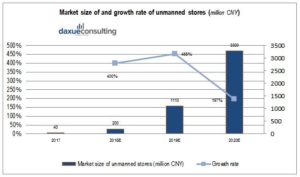
The leading brands are using different technologies in China unmanned store market
The development of technology is a significant support of leading brands among unmanned stores in China. Below are the three most common techniques used by the leading brands of unmanned stores:
- Machine vision
Machine vision uses cameras and computers to perform facial and behavior recognition. Just as a store clerk would at a traditional store would, machine vision can recognize the behavior of taking goods and putting them back.
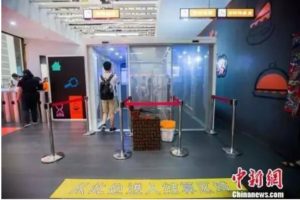
- Radio frequency identification (RFID)
RFID uses electromagnetic fields to automatically identify and track items’ tags. It is used by unmanned stores to improve the efficiency of identifying goods and settlement services.

- Two-dimensional code
The two-dimensional code provides information storage on both horizontal and vertical axes. The most common uses of the technique are Smartphone scanning and settling payment.

There are several leading brands of unmanned stores using these technologies in China.
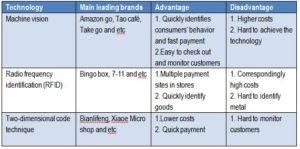
Why unmanned stores in China have huge potential
There is no doubt that unmanned stores have huge potential in China, this is due to several drivers.
- Low labor and rent costs:
Unmanned stores have minimal operations costs. Due to its ageing population, labor costs in China is increasing, therefore cheap labor is becoming more and more scarce. Another burden to traditional offline retail stores is the high rent, especially in tier-1 and tier-2 cities. However, since unmanned stores have no staff in the store and don’t take up much area, the saved cost can be used to reduce the price of products and upgrade technology.

- Better shopping experience:
Improving the shopping experience is the most important goal of unmanned stores. For most consumers, long lines and crowded isles bring a negative shopping experience. Unmanned stores ensure maximum reduction of time that consumers spend on queuing and payment. Thus, it can provide a better experience compared with traditional stores.
- The high popularity of mobile payment:
In China, mobile payment is the main method of payment. In 2016, the share of mobile payment in third-party payments has exceeded 70%. In 2017, the share of mobile payment reached 78.5%. The popularity of mobile payment is helping the development of unmanned stores by digitalizing the operations of offline retail stores. Besides, China is showing a growing app market especially for payment apps, such as Alipay, Tenpay and Lakala. Those apps have a huge number of users because of the Chinese customers’ demand for getting goods delivered at home.
- The experience of leading-edge technology:
Unmanned stores exhibit intelligent technology. Many consumers are drawn into the stores simply for the experience. Such intelligent technology is also useful for data collection and customer behavior analysis in addition to self-service settlement and monitoring goods.
- Policy support:
In 2017, the State Council and many local governments delivered policies to support the transformation of traditional offline retail stores. The policies’ aim is to encourage offline retail stores to use advantages of online retain such as internet, big data and intelligent technology, thereby lowering logistics cost and creating a new model for offline retail. The unmanned store’s development is parallel with these policies and has earned the attention of the Ministry of Commerce.
There are some challenges for the growth of unmanned stores in China
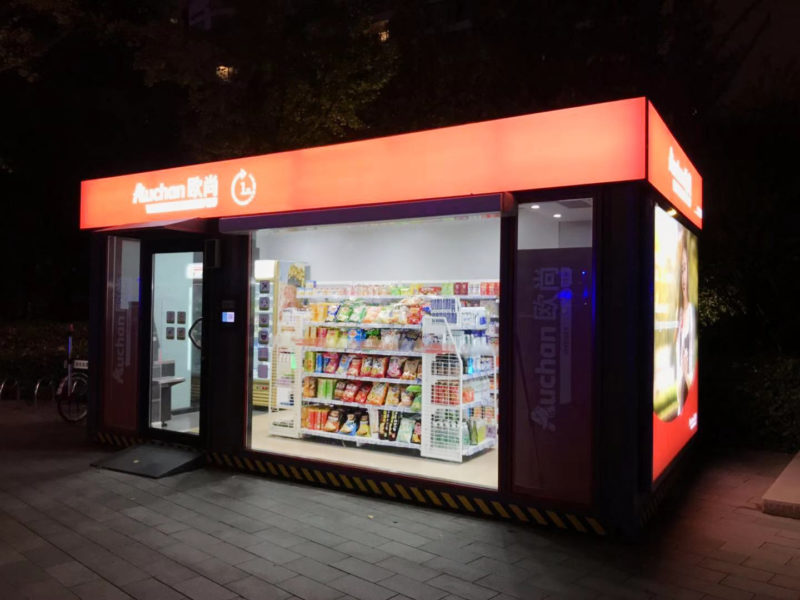
Although unmanned stores have been growing for a couple years in China, they still need to overcome some restraints. Main restraints come from four aspects:
- Small space
Most unmanned stores have smaller space compare traditional stores, which bring two problems; fewer product varieties and limit of the number of customers.
- Costs control
Some technology used by unmanned stores is still immature, thus unmanned stores have to spend more capital on improving techniques. Additionally, stores also need to pay more for the equipment maintenance since there is no staff inside of the store.
- Poor service
Normally, there are no employees in unmanned stores, which could make the lack of user-friendly services.
- Safety issues
Since there are no employees inside unmanned stores, there is no one attending to product safety, food safety and fire safety.

Chinese consumers express both praise and doubt about unmanned stores
According to discussions on Chinese social media such as Zhihu, Weibo and WeChat, there are three hot topics regarding unmanned stores:
- Shopping experience
25% of discussions of unmanned stores on social media pertain to the shopping experience. Most of them are attracted by the intelligent technology, which brings a dreamlike feeling of living in the future, but netizens are let down by the reality of being unable to find the goods they want.
- The influence of unmanned stores on offline retail industry
45% of comments relate to the influence of unmanned stores. On one hand, unmanned stores provide a direction of transformation and upgrading to traditional retail stores, on the other hand, unmanned stores also bring some issues such as the possibility of unemployment in the retail industry.
- Possible development of unmanned stores in China
The topics about development direction trend make up 30% of discussions on social media. First netizens predict unmanned stores will be smarter in the future. Second, unmanned stores will be an important complement for traditional retail stores. Last but not least, its profitability will be poor in upcoming years
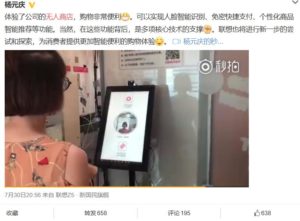
The feedback and comments on social media about unmanned stores focused on both the positive and negative.


Unmanned stores in China are becoming the new growth point of the retail industry
For the fulfilling the diversified demands from the consumption upgrade, China’s retail industry started to enter the per
iod of transition. Its main missions are building a customer-focused structure, cost-cutting and efficiency improvements. The unm
anned store is one of the most important directions in this area. By using the intelligent technology, unmanned stores are devoting to optimizing clients’ experience. The business model of unmanned stores can easily decrease labor and rent costs and give buyers a much happier experience. Currently, the unmanned store is still a relatively new sector for most consumers in China. However, it is becoming a significant part of offline retail industry along with the large-scale establishments of unmanned stores in China.
Daxue Consulting has done extensive research on China’s smart city implementation and can provide market research and strategic positioning for international brands aiming to be a part of China’s unmanned store development
Daxue Consulting has experience and a thorough network among the Chinese smart city ecosystems and related industries, including projects in data processing systems, connectivity offer monetization, and smart lighting and urbanization models. Our team can leverage our knowledge of the market to provide you with key strategic insights on your China market entry.
We used various methods to collect data and reach our conclusions, including in-depth interviews with brand managers, retailers and distributors, focus groups with customers, benchmarking, and a corporate financial reporting evaluation.
Contact us for more information and set up a call with one of our senior research directors.


